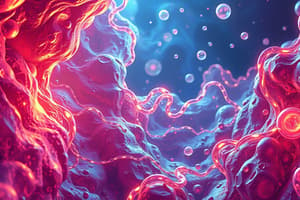Podcast
Questions and Answers
What is a polymer?
What is a polymer?
A macromolecule made up of many units.
What is the smallest repeated unit in a polymer chain called?
What is the smallest repeated unit in a polymer chain called?
Monomer
What is the process of forming a polymer from monomers called?
What is the process of forming a polymer from monomers called?
- Addition
- Condensation
- Hydrogenation
- Polymerization (correct)
Which of the following is a type of polymer that consists of only one type of monomer?
Which of the following is a type of polymer that consists of only one type of monomer?
Which of the following is a natural polymer?
Which of the following is a natural polymer?
What type of reaction is condensation polymerization?
What type of reaction is condensation polymerization?
In addition polymerization, is there a by-product formed?
In addition polymerization, is there a by-product formed?
Match the types of polymerization with their characteristics:
Match the types of polymerization with their characteristics:
What is the role of an initiator in addition polymerization?
What is the role of an initiator in addition polymerization?
The two stages in the addition polymerization process are initiation and ______.
The two stages in the addition polymerization process are initiation and ______.
Thermoplastic resins cannot be softened by heat.
Thermoplastic resins cannot be softened by heat.
What is one factor associated with polymerization?
What is one factor associated with polymerization?
What can inhibit the polymerization reaction?
What can inhibit the polymerization reaction?
Flashcards are hidden until you start studying
Study Notes
Overview of Polymers
- Polymers are macromolecules composed of many repeating units (monomers).
- Monomers are the smallest unit in a polymer chain.
- Polymerization is the process of forming polymers from monomers.
Types of Polymers
- Homopolymers consist of one type of monomer.
- Copolymers are formed from two or more different types of monomers.
Classification of Polymers
Origin
- Natural Polymers: Include proteins and polysaccharides (e.g., agar, alginate).
- Synthetic Polymers: Produced industrially or in labs through chemical reactions (e.g., acrylic resin).
Spatial Configuration
- Linear Polymers: Straight-chain structure.
- Branched Polymers: Side chains extend from the main chain.
- Cross-linked Polymers: Chains are interconnected.
Thermal Behavior
- Thermoplastic Resins: Soften when heated, harden upon cooling (physical change).
- Thermoset Resins: Harden irreversibly through a chemical reaction upon heating.
Polymerization Reactions
- Polymerization is the chemical process that converts monomers into polymers.
- Condensation Polymerization: Involves two molecules combining, releasing a smaller molecule (e.g., water).
- Addition Polymerization (Chain Reaction): Involves the combination of monomers without the release of by-products.
Stages of Addition Polymerization
-
Activation and Initiation:
- Requires free radicals, which are reactive due to unpaired electrons.
- Initiators must be activated by heat, chemicals, or light.
-
Propagation:
- Process where active monomers grow into a polymer chain.
- Involves continuous reactions until all monomers are consumed.
-
Termination:
- Chain growth ends through:
- Direct Coupling: Two active chains form one stable chain.
- Hydrogen Atom Transfer: Transfers a hydrogen atom between chains to form two stable structures.
- Chain growth ends through:
Factors Affecting Polymerization
- Release of heat, making the reaction exothermic.
- Shrinkage occurs as volume decreases during polymerization.
- Residual monomers may remain since the reaction never fully completes.
Inhibition and Retardation of Polymerization
- Impurities in monomers can inhibit or slow down polymerization by reacting with free radicals.
- Hydroquinone can inhibit polymerization without an initiator and slow it down in its presence.
- Substances like eugenol or excess oxygen also inhibit polymerization.
Studying That Suits You
Use AI to generate personalized quizzes and flashcards to suit your learning preferences.




